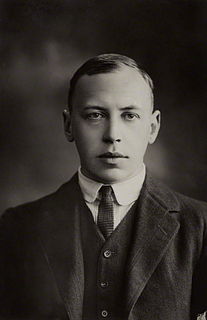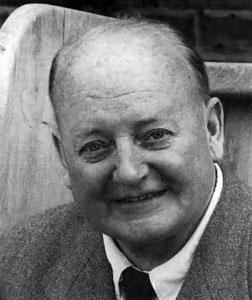A Quote by Alfred Noyes
At a certain stage in his evolution, man himself had been able to lay hold upon a higher order of things, which raised him above the level of the beasts that perish, and enabled him to see, at least in the distance, the shining towers of the City of God.
Related Quotes
Man is a spiritual being, a soul, and at some period of his life everyone is possessed with an irresistible desire to know his relationship to the Infinite. . . . There is something within him which urges him to rise above himself, to control his environment, to master the body and all things physical and live in a higher and more beautiful world.
Christianity exhorted man to set himself up against Nature, but did so in the name of his spiritual and disinterested attributes. Pragmatism exhorts him to do so in the name of his practical attributes. Formerly man was divine because he had been able to acquire the concept of justice, the idea of law, the sense of God; today he is divine because he has been able to create equipment which makes him the master of matter.
The regenerate man's desires are rectified; they are set on God himself, and the things above... Before, he saw no beauty in Christ, for which he was to be desired; but now he is all he desires, he is altogether lovely... regenerating grace sets the affections so firmly on God, that the man is disposed, at God's command, to quit his hold of every thing else, in order to keep his hold of Christ... If the stream of our affections were never thus turned, we are, doubtless, going down the stream into the pit.
It´s a good thing when a man is different from your image of him. Is shows he isn´t a type. If he were, it would be the end of him as a man. But if you can´t place him in a category, it means that at least a part of him is what a human being ought to be. He has risen above himself, he has a grain of immortality.
For here we are so blind and foolish that we never seek God until he, of his goodness, shows himself to us. It is when we do see something of him by his grace that we are stirred by that same grace to seek him, and with earnest longing to see still more of his blessedness. So I saw him and sought him; I had him and wanted him. It seems to me that this is and should be an experience common to us all.
A truly humble man is sensible of his natural distance from God; of his dependence on Him; of the insufficiency of his own power and wisdom; and that it is by God's power that he is upheld and provided for, and that he needs God's wisdom to lead and guide him, and His might to enable him to do what he ought to do for Him.
It is of dangerous consequence to represent to man how near he is to the level of beasts, without showing him at the same time his greatness. It is likewise dangerous to let him see his greatness without his meanness. It is more dangerous yet to leave him ignorant of either; but very beneficial that he should be made sensible of both.
A man unattached and without wife, if he have any genius at all, may raise himself above his original position, may mingle with the world of fashion, and hold himself on a level with the highest; this is less easy for him who is engaged; it seems as if marriage put the whole world in their proper rank.
The level above Man is called the Kingdom of Heaven or Kingdom of God in the Gospels. It has many other names in different writings. In the Gospels, it is said that the Kingdom of Heaven is within. It is at a higher level of a man. To reach it, a man must reach a higher level in himself. If everyone did this, the level of life on this earth would change.
At first, man was enslaved by the gods. But he broke their chains. Then he was enslaved by the kings. But he broke their chains. He was enslaved by his birth, by his kin, by his race. But he broke their chains. He declared to all his brothers that a man has rights which neither god nor king nor other men can take away from him, no matter what their number, for his is the right of man, and there is no right on earth above this right. And he stood on the threshold of freedom for which the blood of the centuries behind him had been spilled.
Man is a fallen star till he is right with heaven: he is out of order with himself and all around him till he occupies his true place in relation to God. When he serves God, he has reached that point where he doth serve himself best, and enjoys himself most. It is man's honour, it is man's joy, it is man's heaven, to live unto God.







































